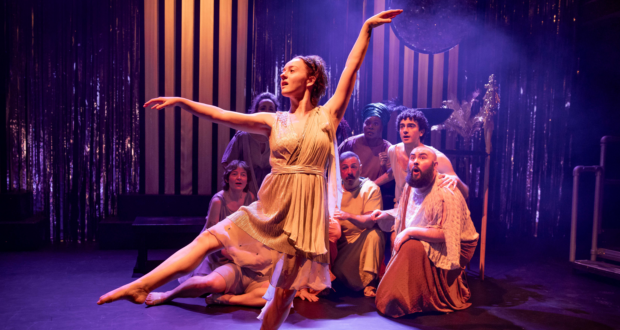An energetic and camp romp, complete with Greek chorus, Sappho attempts to celebrate the poetry and relevance of the lesbian poet both historically and today.Summary
Rating
Ok
Sappho was a prolific Greek female poet writing around 600 BC who lived on the island of Lesbos. Although she wrote on many subjects, she is of course mainly known for her lesbian love poems. Sadly, little of her works survived: only 650 verses out of an estimated 10,000.
Sappho, the musical created by Wendy Beckett, takes the form of a Greek tragedy / comedy, accompanied by a Greek chorus and narrator to highlight the work of this extraordinary woman, whilst showcasing themes of democracy, fluid gender identities and female subjugation.
We are in Lesbos, in pre-pre democracy, the narrator, played with aplomb and flair by Emmanuel Akwafo, assures us. Sappho’s parents, who are without money or influence, are keen to marry her off to Hercules, the son of an influential couple in the village in order to increase their own power. Sappho, however, has vivid and moving fantasies about Adore (Eleanor Kane) who dances nimbly before her; a lithe, sylph like clearly female creature, and so Sappho remains resolute in her determination not to marry a man. Much of the action follows Sappho’s parents attempts to persuade her to marry against her declarations of both sexual and artistic independence. The chorus underpins themes of feminism with chants including “a woman’s tragedy is not that she dies, but that she dies whilst she lives” and, with a more modern slant, a group appear randomly to shout: “We deserve the right to walk the streets at night.”
Many a reference is made to the aristocratic ruling class who have no interest in the desires of the working class (cue laughter given recent local elections and the egocentric actions of our current government). Other Greek Gods make appearances as necessary, particularly Aphrodite, the God of sexual love and beauty. Velile Tshabalala is proudly contemptuous and feisty in this role, a cape barely covering her gold gym shorts.
The decision to use irreverence and flamboyance in a camp fashion is, at best, semi successful. Whilst creating humour and celebrating gender fluid identities, it also undermines the stated desire of the playwright to honour Sappho and position her in history as a powerful and influential scholar. When Sappho herself speaks, it is with authority, and she is articulate and moving. I do not know if the poetry she quotes is translated from her original but it is lyrical, beautiful and powerful. Georgie Fellows, playing Sappho, is accomplished in representing the uniqueness of female strength and vitality. However, these elements are lost in the pantomime-esque frantic escapades of the rest of the action. Other characters are overplayed and appear amateurish with their tendency to gurn and shout. Much of the relevance of the actions of the chorus are lost in a whirling dervish of frenzied movement and the shimmering costumes and shiny gold strip background do little to add to the piece which is reminiscent of school productions.
A fun evening this was indeed, but more historical relevance and in-depth characterisation would give this piece a much needed foundation.
Written by: Wendy Beckett
Directed by: Wendy Beckett and Adam FItzgerald
Sappho plays at Southwark Playhouse until 25 May. Further information and bookings can be found here.
 Everything Theatre Reviews, interviews and news for theatre lovers, London and beyond
Everything Theatre Reviews, interviews and news for theatre lovers, London and beyond



